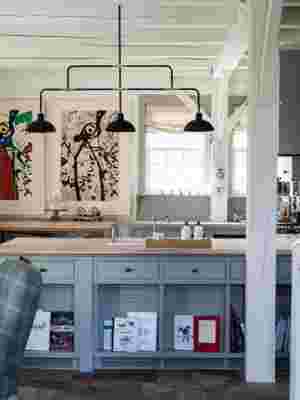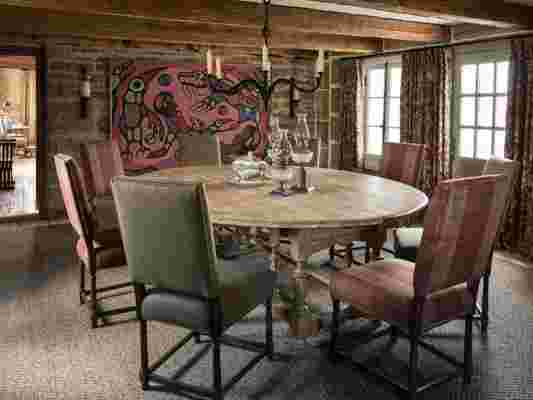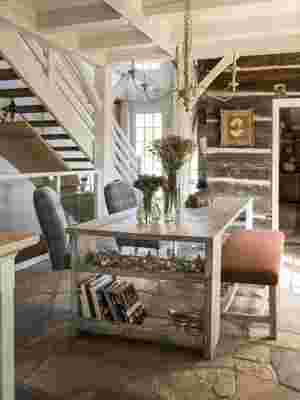At one point or another, every urban dweller dreams of escaping the concrete jungle and getting back to the land. But few embrace that idea quite like one Canadian family. Instead of buying a compact tract and dabbling in husbandry on a small scale, they went all in, purchasing a 160-acre parcel in Hemmingford, a bucolic town on the Quebec border of New York state, and turning it into a fully functioning experiment in permaculture: They created a sustainable commercial agricultural development that supplies fresh meat and produce to high-end restaurants in the area without degrading the earth.
Serious as that sounds, it’s not all work and no play. The estate also functions as a personal retreat, a fact underscored by the 4,500-square-foot farmhouse the family rehabilitated and expanded with help from Richard Ouellette and Maxime Vandal, principals of Montreal-based design firm Les Ensembliers. Inspired by visions of a traditional Scottish manor, Ouellette transformed the crumbling 18th-century buildings, replacing roofing and shoring up the structural integrity of the space, restoring the existing plaster walls and wood and stone floors, and installing modern luxuries like heating and cooling systems and interior bathrooms. “The challenge became finding ways to add those updates without killing the character of the space,” he says, highlighting the lack of bulkheads throughout the home.

Ouellette designed a custom cabinet topped with white oak butcher block for the kitchen. The custom chandelier is by Lambert & Fils, and the artwork is by Joan Miró.
Rather than construct a contemporary ideal of farmstead life, the designer sought to capture something more soulful. “We wanted to keep the spirit of the farm, so nothing is too pristine or perfect,” Ouellette says. “You can come in with your boots on and not feel like you’re disturbing anything. It was really just about updating the aesthetic to make it more livable.” That meant establishing a palette of soft grays, putty greens, and hazy blues that not only evoke the Scottish Highlands but also the pastoral landscapes of the Canadian countryside, then layering in custom furnishings, antiques sourced from around the globe, and pieces from the family’s contemporary art collection. In the kitchen and breakfast room, plaid upholstery, original stone flooring, and white oak butcher block on the countertops provide a rustic counterpoint to abstract art by Joan Miró. Guest suites run on the small side, with dormers and exposed beams, but velvety headboards and luxurious Frette linens bring them into the present. “We loved that everything felt quaint and intimate—that’s part of the experience of being on a farm,” says Ouellette.
Typically more formal in their everyday world in Montreal, his clients now welcome the laid-back lifestyle that comes with farm living during weekend gatherings with loved ones. “It’s a true farm-to-table experience,” says Ouellette. “They invite friends and family to harvest dinners, setting up long communal tables in the vegetable garden and picking ingredients with the chef for formal dinners in the dining room.” In fact, there are no artificial lights in that space, just candles lit overhead to create a romantic glow, “like they did in the 1700s,” the designer says.The ethos was so inspiring that Ouellette and Vandal invested in their own 80-acre weekend property in Canada’s Eastern Townships, with a vegetable garden and plans for a sheep pasture and chicken coop. “I never thought having a farm would be so connecting,” Ouellette says. And just like that, another urbanite bites the dust.


RELATED: This Greek Revival Brownstone Is the Ultimate Nonurban City Home
